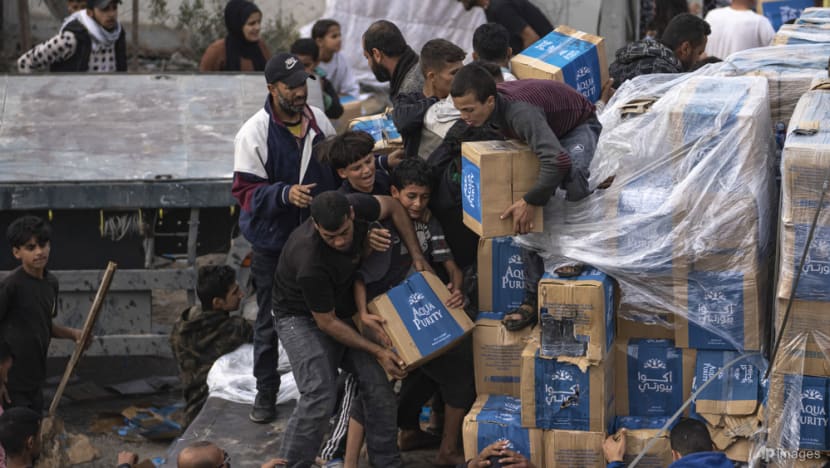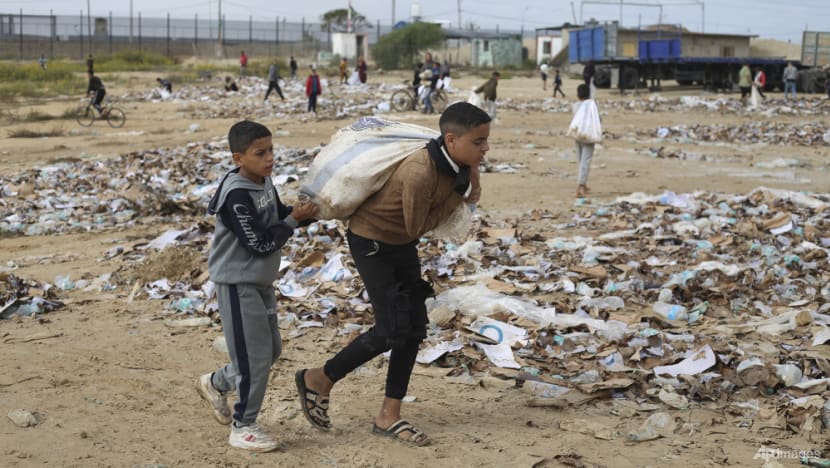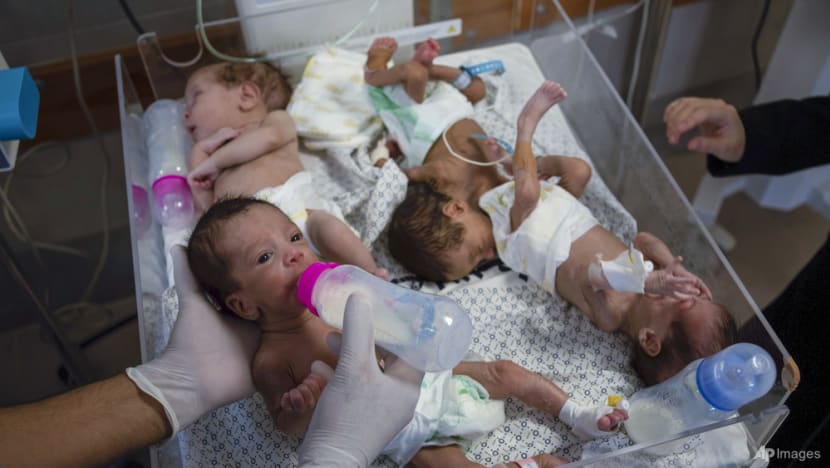Desperation grows in Gaza, as aid struggles to reach affected families: Humanitarians
The war between Israel and Hamas entered its fifth month on Feb 7.

Palestinians loot a humanitarian aid truck as it crossed into the Gaza Strip in Rafah, Sunday, Dec. 17, 2023. (AP Photo/Fatima Shbair)

This audio is generated by an AI tool.
Desperation is growing among families in Gaza, as the conflict between Israel and Hamas makes it tough for aid convoys to deliver food, clean water and medical supplies to those affected, said humanitarians.
The war between Israel and Hamas entered its fifth month on Wednesday (Feb 7).
Israel has been pounding the Gaza Strip and carried out a ground invasion in their retaliatory campaign, since a surprise attack by Hamas militants on Oct 7 last year.
More than 80 per cent of the enclave's population, some 1.9 million people, have been internally displaced, and the bulk of them stay in overcrowded shelters.
TIRED, HUNGRY AND DISAPPOINTED POPULATION
The situation is “very dire” as the fighting wears on, said Mr Ajith Sunghay, head of the UN Human Rights Office in the Occupied Palestinian Territory.
“Fatigue (is) higher,” he told CNA’s Asia First on Wednesday.
“So what you have now is a desperate population, with a massive need for humanitarian aid. You have this population which is tired, hungry, and disappointed.”
Since the start of the conflict, about 100,000 people in Gaza have been killed, injured or are missing, according to the United Nations.
UN Secretary-General Antonio Guterres warned on Wednesday that the world is entering “an age of chaos” with a deeply divided Security Council unable to address critical issues, including the Israel-Hamas war.
He noted that if Israeli forces expand their operations into the southern city of Rafah – Gaza’s last refuge, it will “exponentially increase what is already a humanitarian nightmare with untold regional consequences”.
“People cannot flee anywhere at this point in time. People are not able to go anywhere,” said Mr Sunghay.
“They are constantly being attacked, and they are suffering. That's a major concern for us.”
Palestinian officials have warned of a “triangle of death” for those displaced, referring to hunger, dehydration and disease.
“There is a major shortage of humanitarian aid, particularly food, water, sanitary products, medicines (and) hygiene products,” said Mr Sunghay, adding that families are surviving on one meal a day and scarce water supply.
“We are looking at the kind of situation where we might be confronted with an epidemic.”
Around two-thirds of Gazans were reliant on food aid even before the war. The World Food Programme said more than half a million people face catastrophic food insecurity.
Meanwhile, there is a lack of access to medical care as there are only a few functional hospitals, and they are not able to take in massive numbers of patients, said Dr Aurélie Godard, a medical team leader in Gaza for Médecins Sans Frontières (MSF), or Doctors Without Borders.
“The remaining few (health) structures are currently overwhelmed,” she said.
“NO REAL SAFE PLACE” IN BESIEGED PALESTINIAN TERRITORY
Even in Rafah, the southern area designated as a “safe zone” for Palestinians, explosions can be heard quite regularly,” Dr Godard told CNA’s Asia First on Wednesday.
“Everyone probably knows that there's no real safe place in Gaza,” she added.
“We can hear explosions from time to time here and there. The patients are unfortunately very used to these sounds.”
Humanitarians have been demanding a ceasefire, saying it is the only way to meet the needs of those affected.

“The needs are just gigantic. The basic needs are not covered at all. A ceasefire is the only way that humanitarian aid can enter and at least try to cope with the basic needs of the population,” said Dr Godard.
Currently, access is the biggest stumbling block in bringing in necessary aid, added Mr Sunghay.
“What we've seen is in the past, over 500 trucks a day used to get into Gaza at a minimum. What we see now is at best an average of about 200 trucks, and that is primarily because of the scanning requirements of the trucks before they get into Gaza,” he added.
“But more importantly, once (the trucks) get into Gaza, it's not a given that they are able to reach all the corners of the strip.”

NETANYAHU UNDER PRESSURE FROM WITHIN ISRAEL
On Wednesday, Israeli Prime Minister Benjamin Netanyahu dismissed Hamas' demand for a ceasefire and ordered troops to prepare to move into Rafah.
Hamas had earlier proposed a 135-day ceasefire plan, during which all hostages would be freed, Israeli forces would withdraw troops from the enclave, and an agreement would be reached on an end to the conflict.
United States’ Secretary of State Antony Blinken, speaking in Tel Aviv after meeting Mr Netanyahu, said he still saw “space for the agreement to be reached”.
“I think they have decided that a ceasefire, from their point of view, is a loss. They would be seen by the Israeli public as having lost the war. So the Netanyahu government is opposed to a ceasefire,” Dr Peter Layton, visiting fellow at Griffith Asia Institute, told CNA938 on Friday.
“Blinken is looking long term and being optimistic and hoping for the best, whereas the Netanyahu government seems trapped in this relatively endless war at the moment.”
He added that the Israeli military is not having as quick a success as they originally hoped for.
Mr Ian Parmeter, research scholar at the Australian National University’s Centre for Arab and Islamic Studies, said: “The real problem is that Netanyahu himself is under great pressure from within Israel.”
Related:
Mr Netanyahu is facing numerous pressures, including from some members of his right-wing government, as well as the families of the hostages.
“I don't think he has a lot of room to move at all. It's very clear that the hardliners in his government would be quite determined to follow through with their threat to bring down the government, if he makes major concessions to Hamas in order to get the hostages released,” Mr Parmeter told CNA’s Asia First on Thursday.
“At the same time, he knows that if his government is brought down, he will certainly lose an election and be out of office.”
Noting that this is one of the most destructive wars in modern history, the former Australian ambassador to Lebanon is not optimistic that both sides will come to a potential truce deal.
Mr Netanyahu could conceivably declare victory if he is able to kill or eliminate the two major Hamas leaders Yahya Sinwar and Mohammed Deif, he added.
“If he were able to demonstrably show that he has eliminated them, that would be a way of saying that he has actually removed Hamas. But the problem is that Hamas is an ideology, it's not just a movement.
“And what tends to happen when Israel puts pressure on Hamas is that among Palestinians, support for Hamas grows.”














